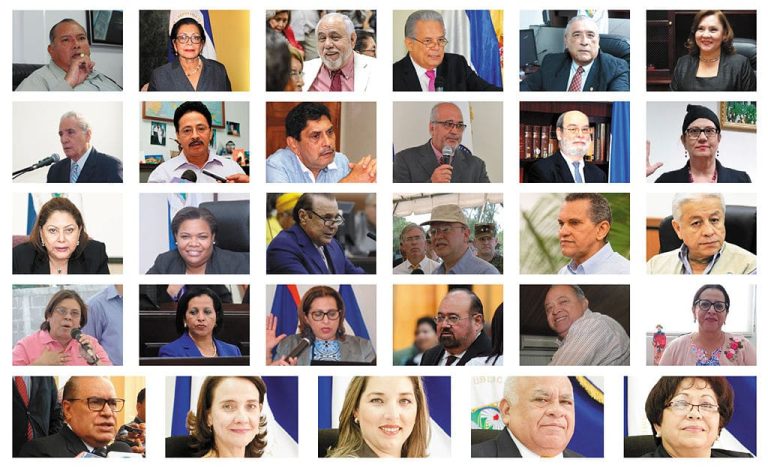29 de noviembre 2020

Children of Exile: The Births “Sowing Hope” in the Camp of Nicaraguan Farmers

PUBLICIDAD 1M
PUBLICIDAD 4D
PUBLICIDAD 5D
Twelve magistrates of the Supreme Court and ten of the Electoral Power have their terms expired since April 2019. VP Murillo prepares the replacements

Twelve magistrates of the Supreme Court and ten of the Electoral Power have their terms expired since April 2019. VP Murillo prepares the replacements
For more than a year and a half, the Supreme Court (CSJ), the Electoral Council (CSE) and the Comptroller’s Office have operated with the terms expired of their top officials. Such hasn’t meant a problem for the Ortega regime. However, sources linked to the Sandinista Front told Confidencial that, in the coming months, replacements are forthcoming in these State powers, after the National Assembly approves the electoral reform ordered by Daniel Ortega. “Changes are coming, but the dates still have not yet been decided,” said the source.
On April 10, 2019, the five-year constitutional terms of 12 of the 16 judges of the Supreme Court expired. Another four seats are vacant due to death or resignation. The situation is repeated with nine Electoral Council magistrates -which has six seat holders and three alternates-, plus the vacancy left by Roberto Rivas Reyes, sanctioned by the United States. Additionally, eight comptrollers, of which five are seat holders and three are alternates.
Most of the replacements will be taking place at the Supreme Court, where in addition to the four vacancies -three due to resignations of Rafael Solis (who broke political with the regime), Carlos Aguerri (health problems), Jose Adan Guerra (without specifying the cause) and the death of Antonio Aleman-, there are three magistrates who are already over the age limit of 75 years to be re-appointed to the seat: liberal party judge Manuel Martinez Sevilla and the Sandinistas Yadira Centeno Gonzales and Francisco Rosales Arguello.
According to FSLN sources, a total of nine CSJ magistrates could be changed, for whom Vice President Rosario Murillo “has replacement plans with appellate magistrates, judges and even some who do not come from a judicial career.”
“The Vice President wants to replace four Sandinistas with people more aligned to her leadership style,” said one of the sources.
Another possible change, in the Justice leadership, is that of pro-government magistrate and Supreme Court President, Alba Luz Ramos, 71-year-old, who has privately expressed her desire to retire from the seat. Ramos is the magistrate with the longest time on the Court: 32 years, but the final decision is in the hands of Ortega.
“The Sandinista leadership of the Court will be left in the hands of magistrates Marvin Aguilar and Juana Mendez,” according to the source.
Regarding the changes of liberal magistrates (Manuel Martínez and Virgilio Gurdian) and the other two who arrived at the Court through negotiations with the private sector (Carlos Aguerri and Jose Adan Guerra), the FSLN sources indicated that Ortega and Murillo have yet to indicate if these will be replaced by Sandinistas or they will promote negotiations with the PLC and the private sector for new nominations.
In the Electoral Council, seven of its ten magistrates have expired terms. Its presidency is vacant and only two of its magistrates have served four of the five years for which they were appointed.
The magistrates with expired constitutional terms are Lumberto Campbell Hooker -since 2018 acting president of the CSE due to the resignation of Roberto Rivas, when the US sanctioned him in December 2017. The others are Emmet Lang Salmeron, Luis Benavidez Romero, and Judith Silva Jaen.
The alternate magistrates are: Virginia Molina Hurtado, Emiliano Enríquez Lacayo, and Miguel Angel Melendez. Only the last of them is a militant of the PLC, while Enriquez, originally from the Conservative Party, joined the pact with the FSLN.
Campbell was also sanctioned by the United States Treasury in November of 2019, because “the Electoral Council continues to engage in undemocratic tactics to guarantee that President Ortega and his allies win elections, including asking government employees to vote for Ortega and other FSLN candidates.”
According to FSLN sources, the changes in the Electoral Power “would respond to the Vice President’s interest to strengthen her control, in the same line as the electoral reforms that will be carried out without changing the Electoral Council.”
The reforms that Ortega will promote do not, until now, contemplate major changes in the structures of the CSE, currently controlled by the FSLN.
“The president gave some specific guidelines on what the reform should contain,” said the source, and specified that it should be focused on technical aspects of the law, such as the electoral register, the composition of local electoral boards and the role of local electoral official.
Ortega’s plan for electoral reforms before the 2021 elections does not recognize any of the preconditions demanded by the Pro-Electoral Reforms Group or the opposition groups, such as the release of political prisoners and restoring democratic freedoms.
Jose Antonio Peraza, member of the Electoral Reforms Group, recently stated that the Ortega proposal “will give as little as possible.”
“If they don’t touch the Electoral Council it means not changing the magistrates, so there the political negotiation is over. What are we going to negotiate? He asked.
Archivado como:
PUBLICIDAD 3M
Confidencial es un diario digital nicaragüense, de formato multimedia, fundado por Carlos F. Chamorro en junio de 1996. Inició como un semanario impreso y hoy es un medio de referencia regional con información, análisis, entrevistas, perfiles, reportajes e investigaciones sobre Nicaragua, informando desde el exilio por la persecución política de la dictadura de Daniel Ortega y Rosario Murillo.
PUBLICIDAD 3D